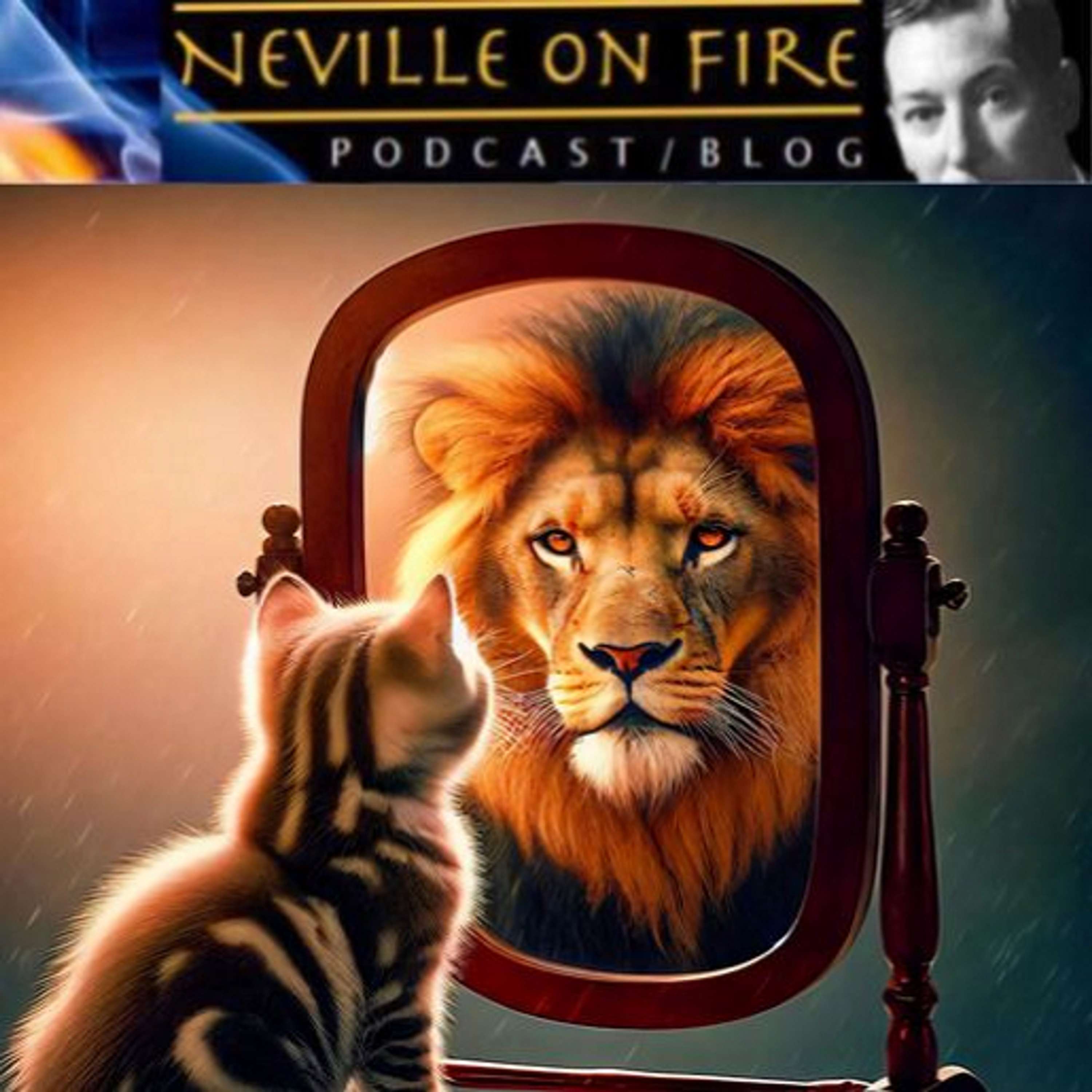Show Notes
SHOW NOTES
Summary of material covered so far in this podcast series.
Neville’s article Fundamentals (show notes Ep. 1) suggests defining an aim, and then observing yourself (reactions, thoughts and emotions) in relation to it.
Difficulty in many forms.
a. The first difficulty is being unable to focus.
b. The second problem is the incessant internal chatter or “monkey mind”.
c. The third difficulty is the experience of seemingly more and more extreme ups and downs.
d. The final form of difficulty that I want to discuss today is the detrimental effects of institutions.
Difficulty: Focus.
Solution 1: Your well-considered and worthwhile aim; do not drift.
Solution 2: Notice what information sources and forms of entertainment you rely upon.
Solution 3: The practical approach to staying on track consists in creating beneficial habits.
Difficulty: Incessant internal chatter.
Solution 4. Neville converts what we thought was a mental nuisance into a great internal tool.
Difficulty: Ups and downs
Solution 5: Understand how the subconscious works. Neville’s treatment is ingenious.
Solution 6: Observing. That’s already a qualitative shift in your mental economy.
Solution 7. Remove from the negative thing your consent. Turn your attention to your aim.
Difficulty: Detrimental effects of institutions.
Solution 8: Identify the “institutions”; contemplate their effects. Compose counter-affirmations.
KEY QUOTE
“But, you are told, you were first in your own sight a grasshopper and because of this you were to the giants a
grasshopper. In other words, you can only be to others what you are first to yourself.” (Neville, At Your Command, Chapter 3)
RESOURCES
Repeat
by Neville; text and audio by Barry Peterson:
Prayer, The Art of Believing
At Your Command
Essential
mp3 download - Neville Mental Diets
Mentioned
Napoleon Hill, Interview with the Devil. Consummate warning against drifting.
Maurice Nicoll
Show Transcript
Episode 003 How to deal with difficulties
[edited for clarity]
Welcome to episode three of Neville on Fire, where we are exploring the system of thought of Neville Goddard and applying his ideas.
So far in this series we covered the idea of awareness of being, and included an exercise by Dr. Rolf Alexander, and we examined the idea that the world without, although it appears without, is within. We referred to an exercise based on Neville’s article called Fundamentals.
Today, I want to discuss how to deal with difficulties. What happens when we start trying to apply on a consistent basis self remembering, self awareness, self consciousness -- and when we start to do visualization, and try to appropriate the state of the desired end, as Neville recommends? After the initial enthusiasm, appreciation we experience at having encountered this philosophy, we soon realize that it's not quite as easy as it looked at first blush. There seems to be some resistance or difficulty that is thrown up by our own minds. So these difficulties of various kinds I've experienced. I want to try to categorize them into four broad types. That way maybe get a handle on them, and I'm going to offer solutions.
The first type of difficulty is being unable to focus, because it just seems that we have too many claims on our time and energy. The second problem is the incessant internal chatter or what people call monkey mind. The third difficulty is the experience of seemingly more and more extreme ups and downs, or vicissitudes. We go from a state of elation appreciation and understanding to sinking down into doubt or fear. And as Neville puts it, we “return to the slavery of our former beliefs”. The fourth category of difficulty that I want to discuss today is the detrimental effects of what I might call institutions, and I will explain that.
Well, let's turn our attention to the first category of difficulty, which is focus. How can we focus our minds on a consistent basis and do the work required when it seems that life is just too busy and demands too much of our time and attention? I think the answer lies in your conception of what life is really all about; what its purpose is. In this regard author Maurice Nicoll had an interesting comment. He said life cannot be solved in terms of itself. This is not to say that life is meaningless. It's just that there doesn't seem to be a readily evident purpose. It seems to be rather chaotic and almost arbitrary in nature. That's a strong clue that we have to bring something to it.
Now, if imagining creates reality as Neville is proposing, whether that imagining is deliberate or simply unconscious and mechanical, then right away we've got an explanation for the seeming arbitrary and chaotic nature of life. Notice how Neville's view actually provides a very effective explanation. The seeming chaos and random muddle of life actually has an identifiable source -- and that is the unconscious and irresponsible imaginative activity of Man (generic Man, man and woman). So in one masterful stroke, this is the answer to all the literature that we might have contemplated on the existential angst, you know, the supposed meaninglessness of life, nihilism and so forth. If the nature of life is not simply absurd and random, but actually is responsive to our own states, then we are much more motivated to bring something to it that is meaningful.
Solution 1. Well, that's our first answer. That's our solution to this problem of focus. It is to bring an internal motive, an unrelenting drive to stay committed to a conduct of life that has a deliberate intention; that is, your personally defined aim. So the question then arises, are we talking about a life aim, or about some sort of so-called spiritual aim? And I think that Neville does not really distinguish [between them]. I think, in his conception, an aim is simply a means to understand yourself, to understand your own being, your own desires, and to be honest with yourself about it.
Now, in this regard, I suggest that you do not judge yourself harshly. Go along with Neville's idea with regard to your desires. He says something quite interesting that I haven't heard before, and that is that our desires arise naturally from our general state (that is, from what we take ourselves to be). Therefore, whatever desires show up should be honoured in order to lead us forward. Now, getting clarity on our true desire is a big step forward.
If you're questioning the conflict of desires and people's activity in the world and in society, I think the Golden Rule is the principle that keeps the intentions and the activity of yourself and others in harmony.
In the literature of Napoleon Hill, the aim is called the definite chief aim, and following on Napoleon Hill's advice (and also that of Nicoll, by the way) the imperative is really that we do not drift. Do not drift in life. We have to use life for some consciously and deliberately conceived ideal (I mean beyond the ordinary requirements of life). And the thing is, if you don't do that, if you don't sort of take life in an active sense, and get something out of it, it will do that to you. It will use you up, it will consume you.
So Neville's expression, with regard to this idea, is you must control your imagination or it will control you.
Now it takes a sort of reversal of mind to take mental effort towards an aim, as opposed to just fulfilling daily necessities. And beyond that, it's taking the aim as a vehicle, as a means to discovering yourself, as opposed to simply holding the aim itself in the highest regard, or making it an absolute.
So I mentioned Napoleon Hill, and I have a reference to one of his works in the show notes. I'll also make a reference now to Neville's wife, who had a vision or a dream, wherein she was instructed not to waste time, not to waste moments, but to use every moment as an investment to work towards your aim. This leads me to my second solution on this first problem of focus.
Solution 2. Notice what information sources and forms of entertainment you rely upon and the company you keep. The reason for that is the ideas and emotions upon which you feed, that is, what you (perhaps unwittingly) consent to and accept feelingly as true -- these will impress themselves upon your imagination. Your subconscious will accept them as your desired end, whether they're desirable or not, and they'll [the subconscious will] deliver them all back to you. So it is possible to undo positive efforts by maintaining detrimental habits.
Solution 3. The practical approach to staying on track consists in creating beneficial habits. You could, of course, set aside a regular time, let's say, for meditation or for study or contemplation of your aim. But even if you don't do that, there are three distinct times in every 24 hour period that everyone, without fail, will encounter: 1. waking, 2. going to sleep and 3. odd moments during the course of the day.
At each of those times, use them to immerse yourself in the feeling of the wish fulfilled, according to your aim (discussed with the exercise in episode 2). So take advantage of those three times -- waking, sleeping, and odd moments during the day -- to work on your chief aim. Following on Neville's advice, it is most important to start the day consciously, which will affect the rest of the day, and then end the day consciously, which will affect the state in which you enter into sleep (i.e., the conditions that the subconscious starts to entertain and work on in sleep).
Let's turn our attention now to the second category of difficulty, which is the incessant internal chatter.
This is the constant complaint of people learning meditation, and the answers given by gurus on this question all seem to be pretty much the same. I remember attending a lecture by Ram Dass back in the day in Ontario. He said, to the question, “how do you make the mind shut up?” -- “Well, you have to be the witness. Just observe the chatter and let it die away of its own accord”... and so on. And this goes back to the exercise of awareness that we've already discussed.
But you know, Neville has the most original and startling answer to this problem of the chatter of the mind:
Solution 4. And that is to direct the internal chatter towards inner conversations of your own creation, that are aligned with your aim (that reflect the aim already achieved).
So at a single stroke, Neville converts what we thought was a mental nuisance into actually a great internal tool. I'm putting a link in the show notes to Neville's lecture called Mental Diets which addresses this problem precisely.
We come down to the third category of difficulty, which is the ups and downs, the vicissitudes.
The problem seems to be that, after gaining new understanding by contemplating new ideas, we are somehow assailed by extraordinary doubt, negative states, and even indifference towards our newfound ideas -- just when we thought we were making progress! It's very frustrating. These ups and downs, for example... you experience first elation, and then you compare that to a subsequent despondency. Well, these seem to have extremes that we hadn't encountered before. Now, I think this is partially a result of simply being more aware of your habitual states, but also is, I believe, a direct result of having consciously engaged with our deeper selves. In other words, by starting to self remember and live life more consciously, we've started some sort of an exchange within ourselves, some sort of an internal activity.
Solution 5. So the first solution is to look into the nature of the subconscious and be aware of this problem and try to approach it in a knowing way, instead of just being at the mercy of it. I think we've all heard quite a lot about the subconscious, but I must say, I haven't seen a discussion of the subconscious that is quite so ingenious as the one that Neville gives. So as an example of that, I'm going to refer you to chapter two of the book that I had already linked to [The Art of Prayer] and I'll just put a note in the show notes for that.
The whole book itself actually is only 30 pages. But he gives you an explanation of the nature and operation of the subconscious. It's not a separate, submerged entity that you're fighting against. Rather, the subconscious and the conscious are actually the same mind. So the result of taking that view is that you stop fighting yourself, you start working with yourself.
So here's [a continuation of] our solution to this difficulty of the ups and downs:
Solution 6. When encountering the difficulty in forms of doubts, despondency, negative states, and so on, first of all, remember your practice of detachment of self awareness. Locate some part of yourself, however feeble it might seem to be in the moment, in the face of the emotion, the anger or the despondency or whatever it is, try to locate some part of yourself that is witnessing.
So already, that's a qualitative shift in your mental economy. You're already aware -- that's a good thing.
Solution 7. Now, here's the second point. Understand that this undesirable state is actually your subconscious trying to communicate with you. It's trying to cooperate with you. It's saying [so to speak] “I'm on board with this new program. But what do you want me to do with this? This [negative state] is something that I learned and it has been inculcated into [“me”] the subconscious mind, for so many years. So what should we do with this at that moment?”
Your answer is simply to remove from the negative thing your attention, remove your consent, remove your belief -- in other words, observe the state, detach from it, and realize that it's not you. It's something that is being thrown up, in a mechanical sense, by your own subconscious.
Once you have that realization, then start to focus right away on what you do want. So this is not running away. It's not repression. It's conscious acknowledgment of a difficulty, and then immediately following on that, deliberately turning your attention to your aim.
You know, quite a lot is said in the work of C.G. Jung to bring the dark side to light, to face your negative states, to bring everything to consciousness, and so on -- all much easier said than done! But start slow. Just do it with small things, and try to be a friend to yourself. Remember, your subconscious is going to be working with you. It's all one mind. It's not a separate entity. And when it presents something undesirable and difficult, that is its only way to present the thing (that you need to remove your belief in; remove your attention from; remove your identity from). Then, as I say, immediately turn your attention to the desirable thing. This deprives the negative state from its motive force, that is, your own consciousness, your own attention.
Well, this brings us to our last category of difficulty, which is the detrimental effect of institutions.
Now, what do I mean by “institutions”? Don't take it too literally. It's simply a term, a technical term, to denote a power structure that we all encounter in life, in one form or another. It could manifest in a large organization, or even a small group of people, or even a single individual.
Now, this is not an easy thing to look at, but I'm convinced that it's very important, because it's probably one of the most insidious difficulties that we have when we're trying to do this work. The detrimental effects on our subconscious can be profound.
So it's precisely the harmful effects of suggestions that we have accepted, usually from childhood, with regard to ourselves, delivered from these so called institutions [that] remain undetected within us. They limit our possibilities to learn new ideas, to master mental assumptions -- this is what we want to do -- to create positive inner conversations, and to call to mind beneficial internal states. There's something in us that's fighting against all that!
Now, if the organizations and the people with whom you deal in life engage in noble things like voluntary association, mutual benefit, and consensual exchange, these are all, of course, highly beneficial and desirable. What we must do, though, is gradually, incrementally, notice where these [or other] various authorities and power structures have made us somehow feel small. Be very wary of the messages that you might have instilled in your own subconscious unwittingly. Things like:
1. you are nothing, you are powerless;
2. you are guilty, you're shameful, you’re unworthy, you're a menace causing harm to others;
3. you are under a constant, dire threat that is wielded by the authority in question, and this holds you in permanent fear.
I think those are the three basic detrimental beliefs that are instilled in individuals by various kinds of institutions.
And the thing is, as we unwittingly confer power to the institution, we realize at the same time that the institution is nothing other than other individuals acting in sleep, and so there's no need to spend a lot of time and blame. We can actually reclaim that power that we had given up.
Therefore, here's my solution to this insidious problem of beliefs that we have instilled in our own subconscious that are undermining our very being.
(Now, at this point, I'm going to reiterate the warning and the disclaimer that I mentioned in episode 1, which is that an exercise such as this could well release a lot of unconscious content with which you might need professional help, when it has to do with trauma or something of that nature.)
However, in my own experience, it's perfectly feasible simply to contemplate the issue calmly and deal with it incrementally and gradually in this way:
Solution 8. First identify the authority figures who had a profound effect upon you, and then contemplate how all of this affected your psyche. How did it affect your valuation of yourself? Now, bring all of this to light, but do not dwell upon the shortcomings of others, on blame and so on. We're taking responsibility for what happened to us.
The solution is to redeem the whole picture and heal yourself by reversing the effects of these social forces with counter affirmations.
Therefore, compose counter affirmations -- statements in the first person, present tense, to reclaim what you've lost, rebuild your:
· self valuation
· self esteem
· confidence
· sense of security, rooted in your divine nature
· capacity for independent thought and reasoned judgment, independent of authority figures,
· creativity
· sense of self worth
What you can do is make these affirmations in written form, and then make audio recordings of them and play them back to yourself, always with an attitude of careful attention and self care, going slowly, going gradually.
Well, let's summarize what we covered today. After a summary of previous content of episodes 1 and 2, we took the topic of difficulties. I thought that perhaps we could actually categorize them in four broad headings: lack of focus, mental chatter, vicissitudes, and what we just discussed -- the harmful suggestions unwittingly accepted from social authorities.
In response to these difficulties, we stated and elaborated on at least 8 specific solutions (and they're labelled as such in the transcript).
There's no need to do it all at once. I suggest that you just follow up on any solution that resonates with you now, and then come back and revisit this episode at a later date. Thanks for listening. We'll talk to you soon.
Listen On
Also Listen
-

Who is Man? Neville’s Radical Answer
Book draft chapter 1. S1E01 revised, inviting your comments.https://nevilleonfir -

The Power of Noticing: How to Interrupt Mechanical Life
Conscious intervention is required for psychological growth. -

Let Go to Move Ahead: Neville and Sedona
First, review of first 15 episodes Season 2. Then explore incremental psychologi -

Conscious Self Persuasion
Science tries to define consciousness where it does not exist, and hypnosis whil


Comments & Upvotes